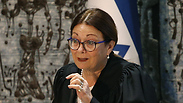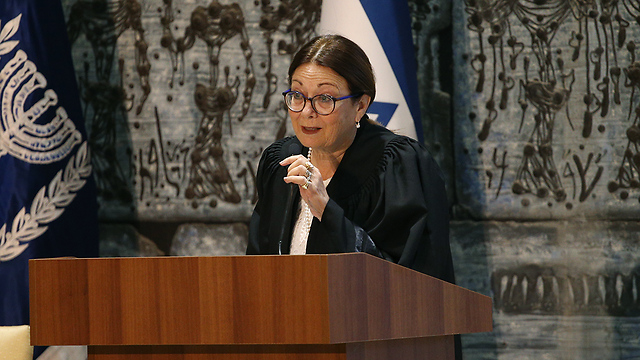
Supreme Court president forbids judges from establishing political ties
After it was revealed last week that some judges form political contacts to lobby for their advancement, Supreme Court President Esther Hayut takes a preventative step against the politicization of the judicial system by officially banning judges from doing so.
Supreme Court President Esther Hayut has forbade Israeli judges from establishing independent contacts with politicians and representatives of the Israel Bar Association on the Judicial Appointments Committee.
Hayut's decree was made following last week's exposé about the politicization of the Judicial Appointments Committee by the investigative journalism Uvda TV program, in which judges appeared to lobby for their advancement.
"The image is not flattering to say the least," wrote Hayut in her first letter to presidents of various courts in Israel.
Hayut wrote that the continuation of such contacts, "and cooperation between the Bar Association and the political parties in the committee, as a declared covenant, poses a danger that the choice will strive to promote a political agenda at the expense of professional considerations.
"The politicization of the judicial system is liable to completely undermine its foundations as an independent and self-reliant system. I intend to do everything possible to protect the independence of the judiciary and to prevent its politicization."
Hayut also wrote that "the composition of the Judicial Appointments Committee was designed so that the committee would form a balance between the political bodies—the legislative and executive branches, and the professional bodies—the judiciary and representatives of the Israel Bar Association."
This, she continued, would ensure that the committee is "primarily guided by professional considerations in selecting the best candidates for the position."
According to Hayut, cooperation between the Israel Bar Association and the political parties in the committee as a declared alliance "poses a danger that the (committee's) appointments will strive to promote a political agenda at the expense of professional considerations."
Hayut concluded by addressing the judges referenced in the exposé.
"The fact that the conference organizers and their hosts held conversations with the judges, which were recorded for the purpose of the article, is very problematic," she wrote. "However, the exposé also serves us as a mirror, of the way some of us conducted themselves at the conference.
"I am sure that what we have witnessed does not represent us all, but even so, we must draw the lesson we need from what we have seen. The judges who choose to continue participating in conferences are required to adhere to the rules set forth in this matter by the Courts Administration, the Ethics Committee and the President of the Supreme Court, and to act in a manner that is befitting of our status as judges."











